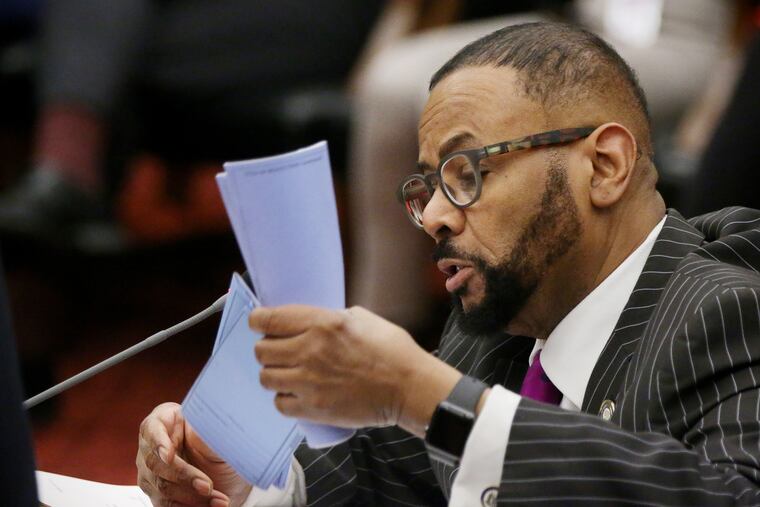Philly Council moves to diversify police, strengthen oversight, curtail stop-and-frisk
One measure, by Councilmember Curtis Jones Jr., will place a referendum on the November ballot that, if voters approve, would create a Citizens Police Oversight Commission.

City Council passed legislation Thursday aimed at strengthening oversight of the Philadelphia Police Department, diversifying its ranks, and curtailing the unlawful use of stop-and-frisk policing.
Lawmakers overwhelmingly approved the three pieces of legislation, which were fast-tracked following the protests over George Floyd’s death in Minneapolis, in the final session before their annual summer vacation. Councilmember Brian J. O’Neill, a Republican whose Northeast Philadelphia district is home to many police officers, cast the lone dissenting vote against the oversight and police diversity measures, but supported the stop-and-frisk legislation.
In addition, lawmakers decided in a unanimous voice vote Thursday to hold hearings on the police response to the protests. Councilmember Helen Gym, who proposed the hearings, said that after seeing officers’ conduct during the demonstrations, including firing tear gas at peaceful protesters and detaining journalists, it was necessary to conduct a review separate from those promised by Mayor Jim Kenney’s administration.
“It is essential that, while I recognize there are multiple investigations going on, that at least one of them is public,” she said. “We need a truth-and-reconciliation process.”
Council members will tackle two additional police accountability bills when they return in the fall. One proposal, by Councilmember Katherine Gilmore Richardson, would require a public hearing on the city’s initial proposal to the police union during contract negotiations. The other, by Councilmember Kenyatta Johnson, would codify and clarify the department’s ban on officers using choke holds and other dangerous tactics to restrain subjects.
Also on Thursday, Council approved a $4.8 billion budget for the fiscal year beginning July 1 that includes last-minute changes to Police Department funding. Responding to protesters urging leaders to “defund the police,” the lawmakers and Kenney last week struck a deal that cut $33 million from the mayor’s original proposal for the PPD, nixing a planned $19 million in additional funding and shifting $14 million by moving crossing guards and public safety enforcement officers to the Managing Director’s Office.
Activists, however, have cast the budget moves as window dressing and said they will not diminish the city’s reliance on policing — as opposed to investing in disadvantaged communities as the city’s primary means of providing public safety. At $727 million, the department’s budget will still be the city’s largest, and Kenney has said he will spare the police force from the hundreds of layoffs other departments will suffer due to the economic recession caused by the coronavirus pandemic.
One of the bills approved Thursday would require new city employees, including police officers, to have lived in Philadelphia for at least one year prior to their hiring.
Council President Darrell L. Clarke, who championed the legislation, has said it is aimed at making the Philadelphia Police Department more diverse. The department is 57% white in a city where the white non-Latino population is 34%.
Critics have said the measure, which applies to the entire municipal workforce and not just police, will limit the talent the city can attract. But Councilmember Cherelle L. Parker, who carried the bill on Clarke’s behalf, said that argument ignores the talent available to the city from its own residents.
“If what you’re saying is that we cannot find Philadelphia residents, out of our 1.6 million population, with all of the institutions of higher learning that we have here, to fill positions in the city of Philadelphia, then that is shame on us,” she said. “The people policing the city of Philadelphia should look like the city of Philadelphia.”
The approval of the bill, which essentially restores a Civil Service residency requirement that Council eliminated in 2008, settles an old score between Clarke and Kenney.
In 2001, then-Mayor John F. Street, Clarke’s mentor, vetoed an attempt to eliminate the one-year residency rule. But in 2008, Kenney, who was on Council at the time, pushed through the elimination of the rule during the beginning of former Mayor Michael Nutter’s administration.
Clarke this week faced significant behind-the-scenes opposition for attempting to restore the requirement. But after a show of unity by Council leadership in a statement supporting the measure Wednesday evening, lawmakers on Thursday sided with Clarke in a veto-proof 16-1 vote.
Councilmember Curtis Jones Jr. authored the legislation approved Thursday that will place a referendum on the November ballot that, if approved, would create a Citizens Police Oversight Commission. While less powerful than oversight boards in some other cities, such as New York, the proposed new body would have more independence to investigate alleged police misconduct than the current Police Advisory Commission, which it would replace.
“When it comes to our police, we have to have the confidence of the citizens of Philadelphia in a process that if you feel wronged … that there is an honest arbitrator that will allow your grievance to be heard,” Jones said.
Another measure, by Parker, will let voters weigh in on the debate around stop-and-frisk, a strategy in which officers are allowed to frequently question and search subjects they have a reasonable suspicion of being involved in criminal activity. Parker said Philadelphia will be the first major city to let voters tackle the issue.
The November ballot question will ask whether voters want to call on the Philadelphia Police Department to end “unconstitutional” stop-and-frisk. Although unconstitutional applications of stop-and-frisk are, by definition, already illegal, analyses of Philadelphia police officers’ incident reports have shown that many continue to stop subjects without having established reasonable suspicion of criminal activity and disproportionately stop racial minorities.